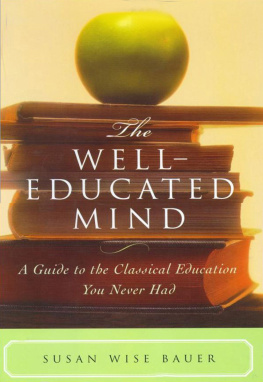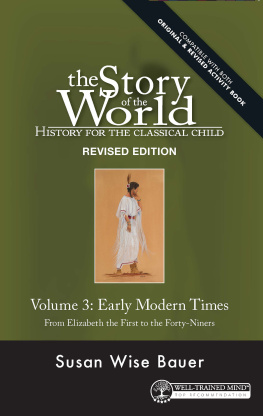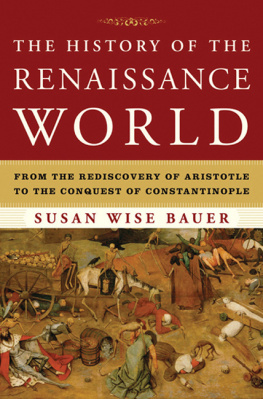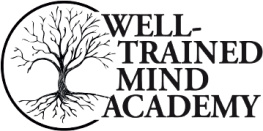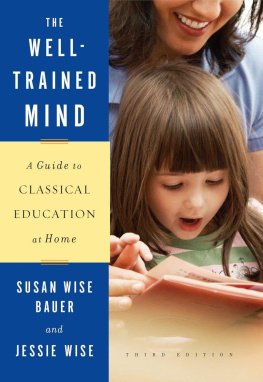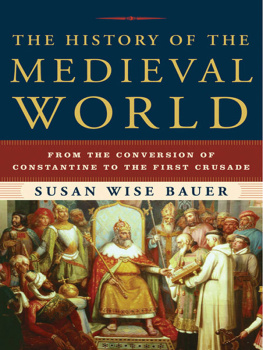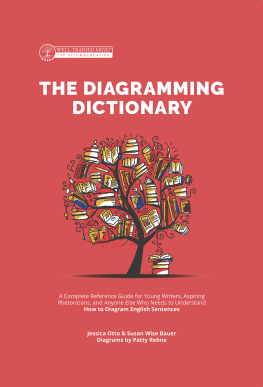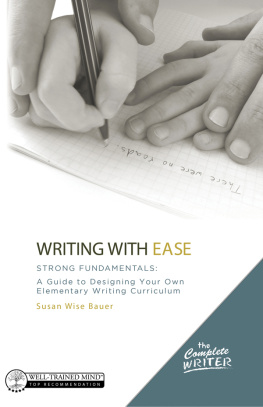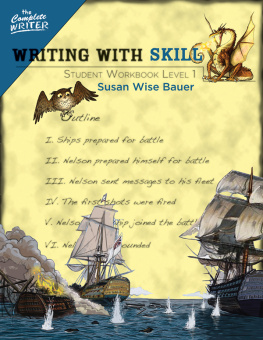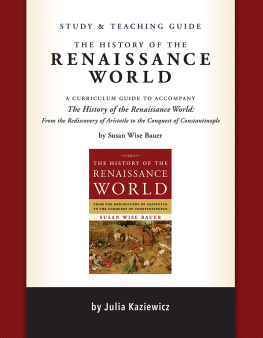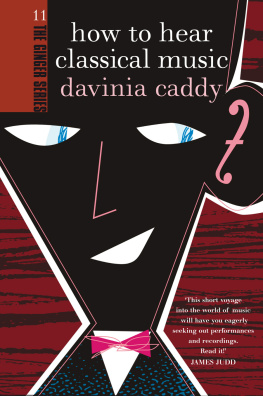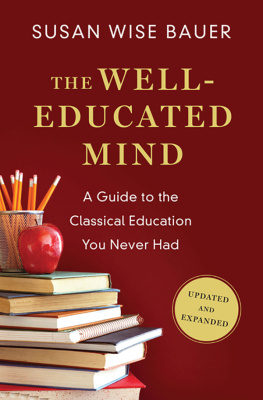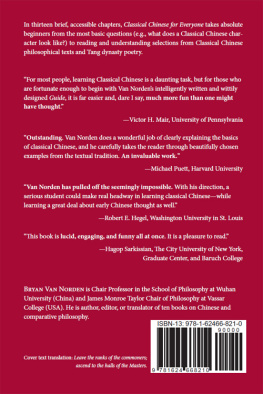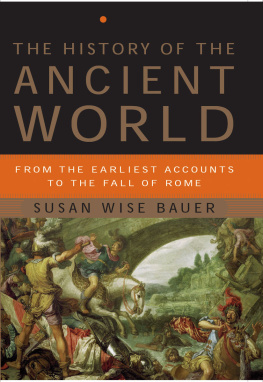(W. W. NORTON, 1999)
The WELLEDUCATED MIND
A Guide to the Classical Education You Never Had
SUSAN WISE BAUER

W. W. NORTON & COMPANY
NEW YORK / LONDON
Copyright 2003 by Susan Wise Bauer
All rights reserved
Since this page cannot legibly accommodate all
the copyright notices, backmatter constitute
an extension of the copyright page.
For information about permission to reproduce selections from
this book, write to Permissions, W.W. Norton & Company, Inc.,
500 Fifth Avenue, New York, NY 10110.
Library of Congress Cataloging-in-Publication Data
Bauer, S. Wise
The well-educated mind: a guide to the classical education you never had /
Susan Wise Bauer.1st ed.
p. cm.
Includes bibliographical references.
ISBN: 978-0-393-07097-2
1. Books and reading. 2. Best books. 3. Reading. 4. LiteratureHistory and criticism.
5. Self-culture. 6. Education, Humanistic. I. Title.
Z1003.B324 2003
028'.9dc21
2003005090
W.W. Norton & Company, Inc., 500 Fifth Avenue, New York, N.Y. 10110
www.wwnorton.com
W.W. Norton & Company Ltd., Castle House, 75/76 Wells Street, London W1T 3QT
For my mother
who taught me to read,
and my father
who gave me all of his favorite books.
Contents
PART I
BEGINNING: PREPARING FOR CLASSICAL EDUCATION
Chapter 1
Training Your Own Mind: The Classical Education You Never Had
Chapter 2
Wrestling with Books: The Act of Reading
Chapter 3
Keeping the Journal: A Written Record of New Ideas
Chapter 4
Starting to Read: Final Preparations
PART II
READING: JUMPING INTO THE GREAT CONVERSATION
Chapter 5
The Story of People: Reading through History with the Novel
Chapter 6
The Story of Me: Autobiography and Memoir
Chapter 7
The Story of the Past: The Tales of Historians (and Politicians)
Chapter 8
The World Stage: Reading through History with Drama
Chapter 9
History Refracted: The Poets and Their Poems
Acknowledgments
MY THANKS TO Starling Lawrence, my editor at W.W. Norton, for his initial interest in this project, and to my agent, Rich Henshaw, for his able guidance and generous advice.
The staff at Peace Hill Press helped to organize my other work so that I could complete this book, and also gave much-appreciated help. Sara Buffington worked on the thankless task of clearing permissions and kept our own publishing efforts running seamlessly along. Justin Moore made endless library trips for me (including the ones in which he returned overdue books I was too embarrassed to show up with), checked facts, entered soul-destroying columns of ISBN numbers, introduced me to the music of The Proclaimers, compounded all this with intelligent readings (of the history chapter in particular), and helped me keep my in-box clear. Justin, I cant imagine why you dont want to stay in downtown Charles City for the rest of your life. (Reconsider?)
Lauren Winner, scholar and writer, read the history chapter and offered invaluable help; thanks, Lauren. Thanks especially to John Wilson, editor of Books & Culture , better known as The Man Whos Read Everything, for the gift of his time and for the gracious criticisms he extended. The book is the stronger for his help; the flaws remaining and anything I say about post-modernism are mine alone.
I owe an intellectual debt to Maureen Fitzgerald, the sanest academic I know; she introduced me to entirely new categories of thought.
My parents, Jay and Jessie Wise, gave me every moral and practical support imaginable, from pep talks and intelligent feedback to baby-sitting and extra groceries whenever I forgot to go to the store. Without their help (and open pantry), our lives would be chaos.
Finally, my husband, Peter, has taken seriously his equal role in child-rearing and housekeeping, which makes my existence as writer/wife/mother/person possible. No thanks are adequate. Sumus exules, vivendi quam auditores.
PART I
Beginning: PREPARING FOR CLASSICAL EDUCATION
Chapter 1
Training Your Own Mind: The Classical Education You Never Had
All civilization comes through literature now, especially in our country. A Greek got his civilization by talking and looking, and in some measure a Parisian may still do it. But we, who live remote from history and monuments, we must read or we must barbarise.
W ILLIAM D EAN H OWELLS,
The Rise of Silas Lapham
T HE YEAR I turned thirty, I decided to go back to graduate school.
Id taken years off from school to write, teach literature as an adjunct lecturer, have four children. Now I was back in the classroom, on the wrong side of the teachers desk. All the graduate students looked like teenagers. And graduate programs arent designed for grownups; I was expected to stuff my family into the schedule designed for me by American Studies, live off a stipend of six thousand dollars per year while forgoing all other gainful employment, and content myself with university-sponsored health insurance, which supplied bare-bones coverage and classified anesthesia during childbirth as a frill. And I found myself dreading the coming year of classes. Id been teaching and directing discussions for five years. I didnt think I could bear to be transformed back into a passive student, sitting and taking notes while a professor told me what I ought to know.
But to my relief, graduate seminars werent lectures during which I meekly received someone elses wisdom. Instead, the three-hour weekly sessions turned out to be the springboard of a self-education process. Over the next year and a half, I was directed toward lists of books and given advice about how to read them. But I was expected to teach myself. I read book after book, summarized the content of each, and tried to see whether the arguments were flawed. Were the conclusions overstated? Drawn from skimpy evidence? Did the writers ignore facts, or distort them to support a point? Where did their theories break down? It was great fun; trashing the arguments of senior scholars who are making eighty times your annual stipend is one of the few compensations of grad-student serfdom.
All of this reading was preparation for my seminars, in which graduate students sat around long tables and argued loudly about the book of the week. The professor in charge pointed out our sloppy reasoning, corrected our misuses of language, and threw water on the occasional flames. These (more or less) Socratic dialogues built on the foundation of the reading I was doing at home. On evenings when I would normally have been watching The X-Files or scrubbing the toilet, I read my way through lists of required books with concentrated attention. The housework suffered and I missed Mulders departure from spook hunting; but I found myself creating whole new structures of meaning in my mind, making connections between theories and building new theories of my own on top of the links. I wrote better, thought more clearly, read more.
I also drove myself into work-induced psychosis. I stayed up late at night to finish my papers and got up early with the baby; I wrote my dissertation proposal on the living room floor, with a Thomas the Tank Engine track in construction all around me; I spent the night before my required French exam washing my four-year-olds sheets and pillows after he caught the stomach flu; I sat through numerous required workshops in which nothing of value was said.

